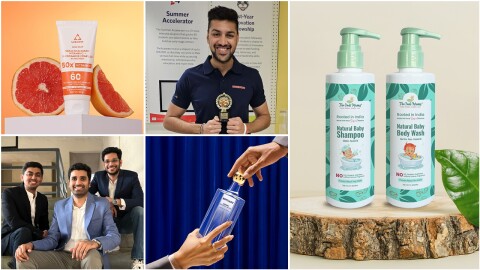It’s 9 a.m and far away from the hustle bustle of Kanpur city, a truck drives in and dumps a whole of load of waste flowers and garlands onto the ground, at a flower recycling unit. Soon the flowers are weighed and distributed among some 70+ women, who have just alighted from their 'office bus.'
They each take a tub of their own to weed the stems, threads, and plastic from the petals.
And here on begin multiple journeys. One, the journey of waste flowers to incense sticks; two, the journey of women empowerment; three, the journey of preserving the Ganges and last but not the least, the journey of a start-up that began with a modest investment of INR 72,000 and today has raised one million dollars! This story of multiple inspiring journeys is the story of Help Us Green.
The Birth Of An Idea
Its founder Ankit Agarwal explains, “I am from Kanpur and was working as an automation scientist. During Makar Sankranti, I was home and a Czech friend of mine was visiting. We were sitting at the Ganga Ghat and in an hour counted at least 150 people take a dip in the river, as it is considered sacred in India. But looking at the polluted water in which these people were taking a dip was disheartening. I spoke about this quite despondently. That’s when he said ‘Why don’t you do something about it?’
My first reaction was ‘this is THE Ganges – what can I do?’ At that every second a truck drove in and a large number of waste flowers were dumped into the river. That shook me from my stupor and despondency. It suddenly struck me that here I have free raw material (in the form of flowers) which I could turn into something. That is how this idea of making a product from waste flowers was born. I made it my mission and vision to preserve the Ganga through livelihoods.”
Making of the incense
There are three main pillars around which Help Us Green functions- temple waste management, women empowerment and cleaning the Ganges. “As the Stanford Social Innovation Review says, we are one of the best circular economics model in the world,” says Ankit adding, “as we move to the UN 2030 goal of sustainability, this is the best place to be in right now.” Elaborating about the process of recycling flowers, Ankit says, “It’s a lean mean mechanism of temple waste management. We have a process where we collect the flowers, segregate petal from stems, wash petals to free them from pesticides and then dry them.
After that the petals powdered and kneaded into a dough which is then rolled into incense sticks. They are dipped in essential oils for the right fragrance and then packed.” Easy it may sound, but the founders of Help Us Green invested heavily in R&D to ensure that the end product is totally organic and chemical free. Their lab at the IIT Kanpur incubation centre has 7 scientists working round the clock to enable this.
Women power all the way
With 43 lakhs worth of sales of incense it’s hard to ignore the human hands that make this possible. As we witness the process, it’s the women whose stories come shining through. Most of the 79 women who work here had jobs as manual scavengers and toilet cleaners. Today, they work in a set up that is clean and gives them a health insurance policy.
It's a job that pays regularly and one that offers them a free to and fro bus commute. “What more do we need. We are able to send our kids to school regularly and our work is no more ‘dirty’,” say these workers, even as one of the women, adds with a shy laugh, “in fact, many women in our locality are now vying for our jobs!” As they sip tea in their “chai break” the camaraderie among the women, the quiet manner in which they go about their jobs to complete their targets is inspiring.
As one of our crew tries her hand at rolling an incense, it is endearing to see the women suppress their smiles and teach her the method, which we realize looks way easier than it actually is. Deepak Mann, the Marketing Manager, says, “They weren’t this comfortable earlier. However, over time they have dropped their guard and speak with us. They joke around in their own groups and enjoy the work. A simple thing like a job has transformed their lives and that is so heartwarming to see.” As the women pack the boxes, they pick colorful pictures of themselves and get to work. Says Sujatha, “It’s such a nice idea to have our photo in the box – whoever buys this will know I have packed it. My kids and family even tease me saying I am now known all over India! I am so happy doing this!”
The Road Ahead
As the incense are packed into boxes and all set for delivery, Ankit says, “We are looking to expand this model to temples in Kashi, Mathura and to the Vaishnodevi, Siddhivinayak and Tirupati temples. In fact, we are now working with UP Government, which has now invited us to form the first policy around temple waste management.
Today we are working with 4.7 tonnes waste, but our plant has a capacity of 12 tonnes. So yes, going green and sustainable is on our road map and doing this by employing 5000 women by 2020 is our goal. In fact, making bio degradable Styrofoam from floral waste is out next big plan. We are calling it Florafoam and it will be the first-of-its-kind packing material that is built entirely from floral waste. Planting the seed of temple waste management may have been a start of this journey, but we have a long way to go.”












